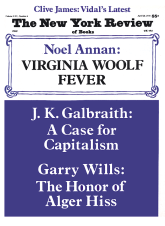In response to:
Picking Up the Pieces from the February 23, 1978 issue
To the Editors:
Roger Sale is an intelligent and sympathetic reader. My gripes about his review of Natural Shocks (NYR, February 23) might better be aimed at the practice of reviewing several very different books in one coherent piece.
Sale says that Thomas Savage and I “begin knowing the final point of their novels and write toward it.” Not I. (If I understand the word “know.”) Writing the end of novels is my reward, the closest thing I know to literary ecstasy. (If the results are lousy, that’s something else.)
Sale speculates that a couple of my characters kill themselves so that a “flexible and moving” paragraph could be written. I don’t think the paragraph would be “moving” if it didn’t carry the story. (I also think Sale came close here to spotting what I think of as the method of this ornery little book. But no cigar.)
Another Salism: “I felt sure Stern was trying to show he could outdo Bellow at Bellow’s kind of novel by being less omnivorous, more restrained….” Sale adds that some of the book’s later scenes “could fit easily into Herzog or Humboldt’s Gift.” I should be flattered by this. I’m not. Nor would any decent writer be. Novel-writing is interesting work, but for me that work doesn’t include this sort of competition. Bellow looked at an early draft of this book and made suggestions, some of which I took. (I’ve done the same for each of his books since Henderson.) Our characters, knowledge, background, temperaments and styles are very different. I don’t believe any good reader could mistake a page of mine for one of his.
A final—small—matter of fact. Sale says Cicia is eighteen. He’s remembering the mistaken dust jacket. The text makes her several years older.
Richard Stern
Chicago, Illinois
Roger Sale replies:
Mark Helprin’s bestiary, or demonology, is lavish, and it is not surprising that such a writer could find a place below the monkeys for critics, especially unsympathetic ones. Nor is it surprising that his lofty tone assumes outraged innocence when it is pointed out that his set piece vision of the Great Bad Place is not just a meatpacking plant but is filled with blacks. They suffer their hell with stoicism, Christian piety—“Never talk down the power of gentle things”—and with what I think must be called nigger heartiness—“When we play cards, we grill up shrimps and bacon, and drink beer.” In a different kind of book these same people could be the heroes, and in that book the picaresque hero would seem merely a spoiled brat. But no, this is a romance, where landscape and characters constantly mesh, and so Marshall is soon out of the packing plant, unscathed, at 12,000 feet, with the golden eagles and Nancy May Baker—“She was not only lovely, but tall, and the direction of her life was very important, touching as it did upon the outermost reach.” No blacks up here, you bet.
No, I do not like the politics of Refiner’s Fire, and see no reason why I should. Marshall Pearl’s “decent intuitiveness” seems to me just another term for unearned elitism, for not letting life happen to oneself. It would take, I should think, a dancing ant to honor it.
It is harder to answer Richard Stern. I liked Natural Shocks, and wanted to like it better than I finally did. The three things he mentions to object to in my review—his handling of the ending so as to make a good deal of the preceding seem like loose ends; the visit to Bruges, which seems put in the book so Fred Wursup can respond to his father’s death as he does in the paragraph I quote; the strong sense of Saul Bellow, especially when Wursup returns home for his father’s funeral—all seem to me signs of a book that has not become rightly articulated, that stays, muffled somehow, below its own surface. But I must apologize for suggesting Stern wrote as if to compete with Bellow; there are a thousand natural shocks to which any writer is heir, and one of them for Stern must be Bellow, and here, I think, he may have suffered such a shock simply because his own hold on his material is not quite as strong as he wished. My guess, my hope at least, is that other readers would agree with me.
This Issue
April 20, 1978



